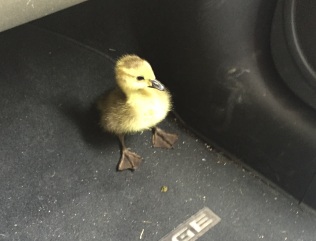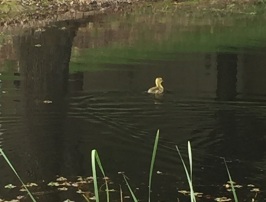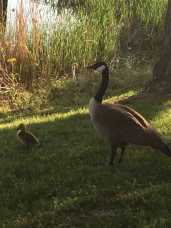On our way home from running errands one afternoon my kids and I watched from the car as a gosling waddled across the road in front us. It was about the size of a small cat and was still covered in yellow down and had no feathers. From the backseat, three small voices pipped up, “Aww, Dad can we stop and see him?
Looking around, I wondered what the gosling was doing in this place. Geese are fiercely protective of their babies. To find one alone like this didn’t bode well for the fate of its parents. So I pulled the car over, got out, picked up the gosling, and placed it on the floor of the passenger seat. Shortly after arriving home, I decided that the best thing we could do for the gosling was to release it in a nearby pond and hope that it would be able to survive on its own.
Shortly after arriving home, I decided that the best thing we could do for the gosling was to release it in a nearby pond and hope that it would be able to survive on its own.
Once we were at the neighborhood pond, I put the gosling down at the edge of the water. The kids cheered as the gosling quickly swam away. Later that night I agonized over the decision to release the gosling on its own. I couldn’t shake the feeling that left to itself the gosling was as good as dead.

The next day, I returned to the pond hoping for confirmation that the gosling had survived the night on his own. I walked around the pond, along the water’s edge, looking through the reeds for that tell-tale yellow of the gosling but didn’t find him. On my way back around the pond I saw what I had missed the first time.

The gosling was alive, and he wasn’t alone. He had been adopted by a pair of geese. The mother goose was sitting on her nest of eggs. The father goose was standing by ready to protect her if the need arose. And between the mother and the father was the lost gosling. Though he wasn’t one of their children by nature he had been adopted into the family all the same. The father goose was now as protective of his new son as he was of the rest of his family.

Seeing how protective this father goose was of his newly-adopted son got me thinking about the relationship between God and all of us. I began thinking about this phrase that I often hear, “We’re all God’s children.” People often use this phrase to diminish the differences that exist between various groups of people, oftentimes in a religious sense. “You follow Jesus; I follow the teachings of Muhammed. Sure there are some differences in our beliefs, but we’re all children of God.”
President Obama made some remarks in 2010 at a Ramadan Iftar dinner at the White House on this topic. He said, “Here at the White House, we have a tradition of hosting Iftars that goes back several years, just as we host Christmas parties, seders, and Diwali celebrations. These events celebrate the role of faith in the lives of the American people. They remind us of the basic truth that we are all children of God, and we all draw strength and a sense of purpose from our beliefs.” (Los Angeles Times, Aug. 13, 2010)
These remarks aren’t unique. They echo the common sentiment of many people today: that it doesn’t matter who or what you worship because we’re all children of God. But is that true? Are we all God’s children?
In a very broad sense I guess a Christian could answer “Yes.” We are all God’s children by virtue of the fact that we are all sons and daughters of Adam and Eve. But we are not all God’s children in a redemptive sense. One of the clearest teachings of Scripture, running from Genesis to Revelation, is that there are two classes of humanity: those who belong to God and those who do not; those who will live with Him forever and those who will not.
In Luke 15 Jesus tells three parables to this effect. We call them the lost parables because each parable highlights something that was lost and is found. There are the stories of the lost coin, the lost sheep and the lost son. Each parable highlights the joy that God has when one formerly lost person is found and added to God’s kingdom. These parables operate under the basic assumption that not everyone is God’s child, although the potential to become God’s child (and God’s great desire for that to happen) is open to all.
Jesus parables are powerful because they allow us to glimpse the kingdom of God, and God Himself, in new ways. They help us to see ourselves more clearly for who we are with and without God. And they help us to answer questions like the one above, “Are we all God’s children?”
The painful truth is that we are not all children of God by nature. The lost parables of Jesus teach not everyone is God’s child. Jesus teaches that there are some people at least who are lost and need to be found. The Apostle Paul speaks even more bluntly about this issue in his letter to the Ephesians. He writes, “And you were dead in the trespasses and sins in which you once walked, following the course of this world…and were by nature children of wrath, like the rest of mankind.” (Ephesians 2:1-3)
Paul makes it clear that left to our own we are not all children of God. By nature we are all children of wrath. We are dead in our trespasses. The words of President Obama sound nice; they’re inclusive, but they are false. Christians, Muslims, Hindus, Buddhists, and Atheists are not all children of God. Not in the redemptive sense. We are all creations of God to be sure, but we are not His children. By nature we are orphaned, lost, and dead.
But Paul goes on to say, “But God, being rich in mercy, because of the great love with which He loved us, even when we were dead in our trespasses, made us alive together with Christ…For by grace you have been saved through faith. And this is not your own doing; it is the gift of God, not a result of works, so that no one may boast.” (Ephesians 2:4-9)
While we are not by nature all God’s children, all are invited to become children of God. Jesus didn’t come for just a select few. Jesus said, “For God so loved the world that He gave His only Son, that whoever believes in Him should not perish but have eternal life.” (John 3:16) Furthermore, we know that “[God] desires all people to be saved and to come to the knowledge of the truth.” (1 Timothy 2:4) And when those early Christians were wondering why Jesus hadn’t returned immediately after His ascension, Peter told them, “The Lord is not slow to fulfill His promise as some count slowness, but is patient toward you, not wishing that any should perish, but that all should reach repentance.” (2 Peter 3:9)
At the beginning of the Gospel of John this truth is spelled out in no uncertain terms. “But to all who received [Jesus], who believed in His name, He gave the right to become children of God, who were born, not of blood nor of the will of the flesh nor of the will of man, but of God.” (John 1:12-13)
The apostle Peter also made clear how a person could become a child of God. After Jesus’ resurrection, while Peter was preaching to the crowds of Jerusalem, they were cut to the heart and asked, “What must we do to be saved?” Peter said to them, “Repent and be baptized every one of you in the name of Jesus Christ for the forgiveness of your sins, and you will receive the gift of the Holy Spirit. For the promise is for you and for your children and for all who are far off, everyone whom the Lord our God calls to Himself.” (Acts 2:37-39)


God created us all but not children of God. Jesus says that His children know His voice and that they follow Him.
Sadly, many believe that they can follow who ever they want and still call themselves a child of God.
God’s children only follow Him.
LikeLiked by 2 people
Couldn’t agree more
LikeLike
Excellent article!!!!
LikeLike
Thanks Rita!
LikeLike